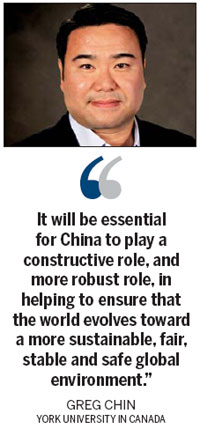On The Agenda
Updated: 2013-11-01 10:04
By Fu Jing (China Daily Europe)
|
|||||||||||
|
Clockwise from above left: Parents waiting in line at the Children's Hospital of Fudan University, Shanghai; on a construction site; battling air pollution; former railways minister Liu Zhijun, who received a suspended death sentence in July for taking bribes and abuse of power. The plenum is likely to tackle problems as wide ranging as healthcare, urbanization, the environment and corruption. Photos Provided to China Daily |
Sustainable development in the limelight
Ahead of the Communist Party's much awaited plenum that begins on Nov 9, expectations are high that the meeting will provide the future reform agenda for China and clear the decks for sustainable, balanced development. As the 200 members and 170 alternate members of the Party's Central Committee get ready to meet in Beijing to discuss among other things China's economic blueprint, experts agree that reforms will undoubtedly be the main point of discussions.
Historically, third plenums have been the springboard for key reforms in China, particularly on economic matters. While some experts feel the meeting may call for more bold, drastic reforms, others feel it will be a case of gradual, incremental changes.
Yu Zhengsheng, China's top political adviser, in a recent interview with Xinhua News Agency, indicated that the meeting will "principally explore the issue of deep and comprehensive reforms".
The reforms this time "will be broad and will be unprecedented", he said, adding that, "it will strongly push forward profound transformation in the economy, society and other spheres".
The Political Bureau of the Communist Party of China Central Committee said in a statement on Oct 29 that the realization of the Chinese dream of national rejuvenation, a concept that has been promoted by the new Party leadership, requires deepening reforms comprehensively.
The Party will speed up development of the socialist market economy, democracy, cultural development, social harmony and environmental protection, it said.
Reforms aside, the meeting is also expected to concentrate on the fact that despite the uncertain external environment, China needs to assume more global responsibilities and champion world economic revival with swift and timely measures. Experts feel international attention on the meeting is sharper this time, as the development agenda will have a profound impact on the rest of the world.
New model
"One of the key reform objectives for China is to move toward a new model of sustainable and equitable development, one in which there is more balance between ecological sustainability and growth, and provides better sustenance opportunities for all," says Gregory Chin, associate professor of political science at York University in Toronto.
It is logical to expect that more measures in this regard will be announced at the political gathering as the Party has already pursued "ecological civilization" as one of the five pillars of its vision, though much still needs to be done on environmental aspects, he says.
In this regard, Chin says, policymakers need to take more steps to ensure ecological sustainability, pay more attention to the biosphere (and human life within it), rethink how much economic growth is needed, and how it can be achieved in more efficient and sustainable ways.
At the same time, growing disparities in wealth and opportunities need to be reduced, while measures are needed to ensure clean, ethical and fair governance.
Glyn Ford, a former member of the European Parliament, says China should opt for an incremental, rather than radical, reform agenda.
He says continuation of balanced development in urban and rural areas, and coastal and inland regions is needed while the country tackles other pressing issues such as corruption, rule of law and the need to stabilize population movements. "I think the imbalance between the rural and urban, coastal and inland regions and rule of law are the biggest challenges that China faces," Ford says.
Fresh challenge
Chin of York University says the two main domestic challenges for China are ensuring further advances in clean, ethical and fair governance, and in environmental management and sustainable development, with social tensions appearing to have been on the rise in these two areas.
Measures are needed to strengthen and improve corruption prevention to achieve the first goal, he says. For sustainable development, a fundamental shift in the mindset and priorities of all stakeholders and within society are necessary.
 |
Chin says breakthroughs must be made in the way problems are viewed and tackled, such as rethinking GDP in terms of "green GDP", and changes in the performance assessment and promotion/demotion criteria for leaders at all levels.
Alex Kirby, a retired BBC journalist who has tracked China's development for several years, lists ending corruption as the greatest challenge. He feels that it is important to tackle corruption with a "one stone kills several birds" approach.
"Once corruption stops, China will be able to maintain the growth it needs to end poverty and to protect the environment (its own and the world's)," Kirby says.
Martin Schoenhals, a professor at Columbia University in New York, expects the meeting to provide breakthroughs in achieving social equality in China. "From my perspective as a long-time researcher on China, what is worrisome is the growing inequality," he says.
Schoenhals says farmers are the key to the growth puzzle. "They account for more than 70 percent of the population, even though some of them no longer hold any land. Historically also, China had a revolution that sought to provide land to farmers. If farmers lose land, or access to land, it will result in mass migration to cities and urban poverty, Schoenhals says.
"What worries me is whether these hundreds of millions of farmers can move to the cities and all find and keep jobs."
China's new leadership has already provided enough indications that it plans to chart a roadmap for urbanization. While this has long been in the works, experts feel that the plenum will provide the much-needed impetus by including it in the reform agenda.
However, Schoenhals feels the reform agenda should have steps to limit urbanization and outline steps to help farmers remain in the countryside if they so wish.
Today's Top News
Premier Li seeks point of balance
Reform roadmap before key meeting
Intel leaks proved justified: Snowden
Cooperation needed in terror fight
Beijing to further boost visa-free stay
Shenzhou X crew awarded for outstanding service
US to file murder complaint against LAX shooter
China's non-manufacturing PMI rises in October
Hot Topics
Lunar probe , China growth forecasts, Emission rules get tougher, China seen through 'colored lens', International board,
Editor's Picks

|

|

|

|

|

|






